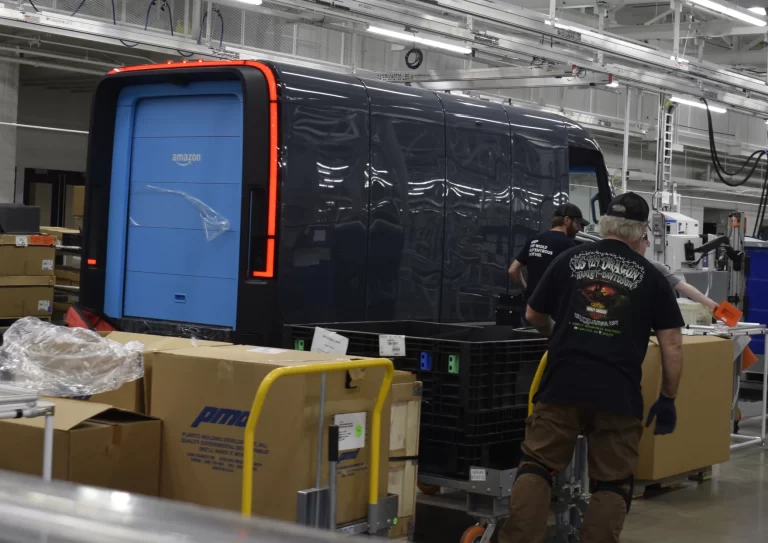NORMAL – A second shift of workers is now making electric vehicles at Rivian’s plant in Normal, even as global supply chain issues continue to be the “largest source of uncertainty” for the company.
Rivian now has 6,680 workers in Normal. Adding a second shift increases the hours each day when vehicles are being produced – a key step if the plant is to ever reach its 150,000-vehicle annual capacity. Rivian is only aiming for 25,000 this year, and supply chain constraints are one of the reasons why.
“We’ve experienced five days of production downtime in October and November due to lack of supply of a key component, which limited our quarter-to-date production,” Rivian chief financial officer Claire McDonough said Wednesday on the company’s quarterly call with investors.
Rivian’s Normal plant made 7,363 vehicles from July-September – a 67% increase from the previous quarter. That quarterly production total will have to jump again (to at least 10,600 between October-December) to meet the company’s 25,000 target for the year.
And there’s a lot of demand. Rivian’s order backlog for trucks and SUVs (R1 series) has climbed to 114,000, up from 98,000 last quarter. (Rivian says it’s going to stop disclosing preorder numbers.) And sales are starting to generate real money; Rivian pulled in $536 million in revenue in the third quarter.
Nearly 90% of Rivian customers have never owned an electric vehicle before, said Rivian founder and CEO RJ Scaringe.
“Most of our customers are new EV customers, which is really important from a mission point of view,” Scaringe said. “The brand, the products we’ve created – we’re helping to create new EV customers. We’re driving that transition.”
Delaying R2 in Georgia
Meanwhile, Rivian said it would delay the launch of its next vehicle line (the “R2”) from 2025 to 2026. The company previously said the R2 platform will be a “more accessibly priced” (lower price point) “mid-sized SUV targeting global markets.”
Rivian wants to make R2s in Georgia, where last year it announced plans to build a $5 billion manufacturing plant. Rivian has run into legal challenges to its plans in Georgia.
“This is really reflective of making sure the production site is prepared and we have the appropriate amount of time to go through the ramp-up phase,” Scaringe said of the one-year delay.
Added McDonough: “We expect the R2 platform will unlock a massive, global market expansion opportunity for Rivian, and we’re excited about the development work underway,” McDonough said.
Delivery vans
In addition to the consumer trucks and SUVs, Rivian is also on contract to build 100,000 electric delivery vans for Amazon. The companies have not released exact production totals for those vans, but Rivian says the new vans are now “making deliveries in over 100 U.S. cities.”
Rivian wants to (and can) sell electric vans to more businesses than just Amazon. It recently announced a joint venture with Mercedes Benz to make electric vans in Europe.
Rivian is also taking steps to make its American-made vans more affordable for fleet customers. Up until now, Rivian has been using motors built by Bosch. But Rivian is now able to make its own fully in-house drive units, called Enduro – the latest step toward vertical integration at the Normal plant. It will be put into Rivian’s vans starting in early 2023, said Scaringe.
Enduro motors come at a “significantly lower cost,” Scaringe said.
Rivian lost $1.7 billion in the third quarter. That’s not unexpected. It took 18 years for Tesla to turn a full-year profit, which it finally did in 2020. That year it made 500,000 vehicles.
Rivian has $14 billion in cash on hand.

